Japan approves hiring of migrant workers
Kathmandu, December 25
The Japanese government has approved the hiring of migrant workers from various countries that include Nepal, China, Indonesia, Mongolia, Myanmar, Thailand, the Philippines and Vietnam. With this decision Nepali migrants will now be able to fly to the third-largest economy of the world for employment opportunities.
After lengthy discussions over months, the Japanese cabinet today has finally approved a law whereby Japanese firms will be allowed to employ blue-collar workers from Nepal and the aforementioned nations from April.
Apparently, Nepal is the only South Asian country that will be allowed to enjoy the facility.
As per The Japan Times, a renowned newspaper of Japan, the blue-collar policy measures that have been adopted will provide greater support for those hoping to benefit from the new visa category.
“We have held negotiations with Japanese authorities on many occasions for a bilateral labour pact,” said Mahesh Prasad Dahal, secretary of Ministry of Labour, Employment and Social Security. “Though a labour agreement has not been signed yet this decision by the Japanese government is good news for the country’s foreign employment sector.”
According to Dahal, a Japanese delegation will come to Nepal in the beginning of January for concrete talks that will include issues related to salary and benefits, among others. After that both the governments will finalise the mechanism for supply of Nepali workers to Japan. The government plans to send Nepali workers to Japan in a model similar to Korean Employment Permit System.
As per the Japanese government’s decision, over the first five years, about 345,000 foreign workers will be allowed to work across 14 industrial sectors, including nursing care, janitorial work, manufacturing, the hotel industry, agriculture and fishing, as well as food processing and food services.
The measures include the establishment of about 100 consultation centres nationwide offering support in 11 languages — Nepali, Japanese, English, Chinese, Vietnamese, Korean, Spanish, Portuguese, Indonesian, Thai and Tagalog.
“This is a major development for country as migrants will now have option to travel to a country which not only is third largest economy but also has strong labour laws,” said Ganesh Gurung, a foreign employment expert. “This will also end compulsion of labourers to go to only the Gulf or Malaysia.”
The Japanese government is also allocating 600 million yen for a Japanese-language education programme for non-Japanese that will include a standardised curriculum and textbooks.
As per The Japan Times, under the revised immigration law, Japan will provide working visas for blue-collar foreign workers with certain skills and expertise for the first time, as it deals with an acute labour shortage caused by the greying of its population.
Meanwhile, Japan plans to spend 3.4 billion yen on Japanese language education overseas. As part of programme, it will introduce a computer-based testing system, giving foreign nationals a chance to test their abilities.
The new visa category allows foreign workers who are 18 years or older to apply for two new residency statuses. The first type is for people who will engage in work that requires a certain level of knowledge and experience, while the second type is for work that requires higher skill levels.
Those with the first status, which is valid for up to five years, will not be allowed to bring family members to Japan. But entrants granted the second status will be allowed to do so and will also be permitted to repeatedly renew their visas.
Workers will also have the freedom to change jobs and move to another part of Japan within the same professional area and using the same expertise for which they were initially accepted.






